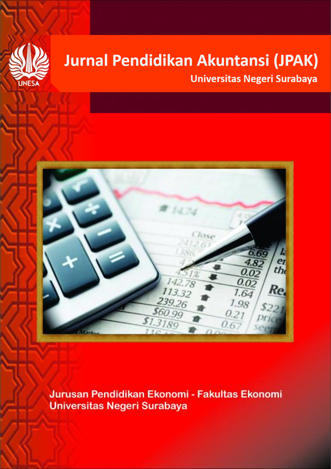Pengaruh Bahan Ajar Digital, Kemandirian Belajar, dan Keaktifan Peserta Didik Terhadap Hasil Belajar Mata Pelajaran Praktikum Akuntansi Jasa, Dagang, dan Manufaktur
Keywords:
Digital Teaching Materials; Learning Independence; Liveliness; Learning outcomesAbstract
This study aims to determine the effect of digital teaching materials, learning independence and activeness on the learning outcomes of accounting practicum for students in class XI AKL SMKN 1 Surabaya. The research is a type of quantitative research by taking a sample of 140 students. The results of data processing through SPSS 25 show that there is a simultaneous influence of teaching materials, independent learning, and activeness on learning outcomes with a significance value < α 0.05. The average level of influence of each variable such as digital teaching materials and activeness has a moderate level of influence and learning independence has a fairly high level of influence on learning outcomes. There is a moderate level of influence due to the utilization of teaching materials that are not optimal and the lack of student focus in learning activities. As well as the need for interest and learning discipline to improve good learning outcomes.
Downloads
References
Aini, P.N., & Taman, A. (2012). Pengaruh Kemandirian Belajar dan Lingkungan Belajar Terhadap Prestasi Belajar Akuntansi Siswa Kelas XI IPS SMA Negeri 1 Sewon Bnatul Tahun Ajaran 2010/2011. Jurnal Pendidikan Akuntansi Indonesia, Vol. X, No. 1
Anisah, dkk. (2021). Pengaruh Pembelajaran Digital Terhadap Hasil Belajar Siswa. Jurnal Manajerial. Universitas Jayabaya, Vol. 15, No. 1
Anna Medekawaty. (2019). Pengaruh Kemandirian Belajar dan Efikasi Diri Terhadap Pemahaman Akuntansi Siswa. Universitas Samawa. Vol. 7, No. 2
Arwinda Wulandari. (2022). Analisis Kemandirian Belajar Pada Pembelajaran Matematika Kelas VIII UPTD SMP Negeri 23 Barru. Institut Agama Islam Negeri Parepare. Vol. 1, No. 2
Aprilyana Eka Saputri. (2020) Pengembangan Bahan Ajar E-Book Pada Mata Pelajaran Praktikum Akuntansi Perusahaan Manufaktur.Jurnal Penelitian Pendidikan. Vol. 20, No 2
Artika Vivi Fitriyani, Susanti. (2020). Bahan Ajar E-Book Interaktif Mata Pelajaran Praktikum Akuntansi Lembaga Berbasis Kontekstual. Jurnal Penelitian dan Pengembangan Pendidikan. Vol. 4, No. 3
Azwar, S. (2013) Metode Penelitian. Yogyakarta: Pustaka Belajar.
Cahyasari, I. & Dewi, R. M.(2016). Kebiasaan Belajar dan Kemandirian Belajar Terhadap Hasil Belajar Siswa. Jurnal Pendidikan Ekonomi. Vol. 4, No. 3
Darwanto., Venty Meilasari. (2022). Bahan Ajar Digital Sebagai Alternatif Pembelajaran Jarak Jauh dan Mandiri (Pengembangan Bahan Ajar Mata Kuliah Teori Graf). Jurnal Basicedu. Vol. 6, No. 1
Deby Rahmita Maulida. (2021). Pengembangan Media Pembelajaran Electronic Book (E-Book) Pada Mata Pelajaran Praktikum Akuntansi Dagang. Jurnal Pendidikan Akuntansi. Vol. 9, No. 3
Depdiknas. (2003). Undang-undang RI No. 20 tahun 2003 tentang sistem pendidikan nasional.
Dewi Nurbaiti. (2020). Pengaruh Sikap Pada Ebook dan Sikap Pada Buku Fisik Terhadap Minat Baca Masyarakat di Era Industri 4.0. Jurnal Logistik Indonesia. Vol. 4, No. 1
Ery Novita Sari. (2019). The Impact of Independent Learning on Students Accounting Learning Outcomes at Vocational High School. Jurnal Pendidikan Vokasi. Universitas Negeri Yogyakarta. Vol. 9, No. 2
Ismail Saleh Nasution, dkk. (2020). Mapping of Digital Teaching Materials Development Needs. Journal of Education, Humaniora and Social Sciences. Universitas Muhammadiyah Sumatera Utara. Vol. 3, No. 2
Noviyanti Utami. (2021). Analisis Kebutuhan Bahan Ajar Digital dalam Pembelajaran IPA di Sekolah Dasar. Jurnal Basicedu. Vol. 5, No. 6
Nur Fajar Alam, dkk.(2016). Efektivitas penggunaan virtual learning terhadap motivasi dan hasil belajar siswa di SMK Negeri 2 Makassar. Universitas Negeri Makassar
Muzanip Alperi. (2019). Peran Bahan Ajar Digital Sigil Dalam Mempersiapkan Kemandirian Belajar Peserta Didik. Jurnal Teknodik. Vol. 23, No. 2
Prayuda, R., Thomas, Y., & Basri.(2014). Pengaruh Kemandirian Belajar Terhadap Hasil Belajar Siswa Pada Mata Pelajaran Ekonomi Di SMA. Vol. 3, No. 8
Ramlah, dkk. (2014). Pengaruh Gaya Belajar dan Keaktifan Siswa Terhadap Prestasi Belajar Matematika (Survey Pada SMP Negeri di Kecamatan Klari Kabupaten Karawang). Jurnal Ilmiah Solusi. Universitas Singaperbangsa Karawang. Vol. 1, No. 3
Rahmawati, S., & Susanti. (2019). Pengembangan Bahan Ajar E-Book Pada Mata Pelajaran Praktikum Akuntansi Lembaga Berbasis Kontekstual Untuk SMK. Jurnal Pendidikan Akuntansi (JPAK). 383-391
Wirayat, A., Junaidi, Matsum, H., & Okiana. (2015). Pengaruh Kemandirian Belajar Terhadap Hasil Belajar Siswa Pada Mata Pelajaran Ekonomi Di SMA. Jurnal Pendidikan Dan Pembelajaran Khatulistiwa. Vol. 4, No. 8
Downloads
Published
How to Cite
Issue
Section
License
Copyright (c) 2025 Yunia Tri Argina, Rochmawati

This work is licensed under a Creative Commons Attribution-NonCommercial 4.0 International License.
Authors who publish with this journal agree to the following terms:
- Authors retain copyright and grant the journal right of first publication with the work simultaneously licensed under a Creative Commons Attribution License that allows others to share the work with an acknowledgement of the work's authorship and initial publication in this journal.
- Authors are able to enter into separate, additional contractual arrangements for the non-exclusive distribution of the journal's published version of the work (e.g., post it to an institutional repository or publish it in a book), with an acknowledgement of its initial publication in this journal.
- Authors are permitted and encouraged to post their work online (e.g., in institutional repositories or on their website) prior to and during the submission process, as it can lead to productive exchanges, as well as earlier and greater citation of published work (See The Effect of Open Access).

Jurnal Pendidikan Akuntansi (JPAK) is licensed under a Creative Commons Attribution-NonCommercial 4.0 International License.
 Abstract views: 248
,
Abstract views: 248
, PDF Downloads: 154
PDF Downloads: 154



